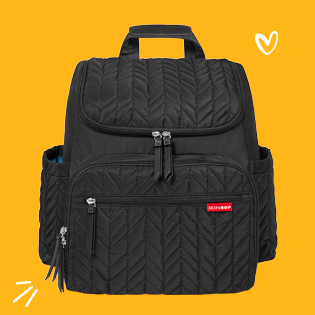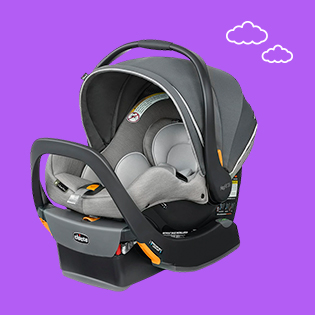Whether you're exclusively pumping, building up a freezer stash before returning to work, or headed on a romantic getaway, being able to pump and store your breast milk can be hugely helpful for nursing moms. But it's not uncommon to notice changes in the appearance, smell, or taste of your breast milk after it has been in the refrigerator or freezer for some time.
If your stored milk smells or tastes off — particularly soapy or metallic — you might wonder what’s causing it and whether it’s still safe for your baby. One possible culprit is excess lipase activity in your milk, also called high lipase breast milk.
“It’s the worst,” said What to Expect Communtiy member kmd718. “I froze lots of breast milk before figuring out I had high lipase and baby won’t take anything of mine that’s been frozen.”
The good news? If you have high lipase breast milk, there are ways to manage the altered smell or taste. "As long as it’s been stored properly, your milk is still safe and nutritious for your baby," says Suzanne Chan, DNP, a board-certified pediatric nurse practitioner working in the Infant Cardiac NICU at NewYork-Presbyterian Morgan Stanley Children's Hospital in New York City who is also a certified lactation counselor (CLC), and member of the What to Expect Medical Review Board.
High lipase breast milk can develop a soapy, metallic, or sour smell or taste after storage due to excess lipase breaking down fats too quickly — but it remains completely safe and nutritious for babies.
Not all babies mind the altered taste, but if yours does, strategies like mixing stored milk with fresh, mixing with purees if your baby has started solids, or serving it chilled might help improve acceptance.
If you suspect high lipase activity, consult your pediatrician or lactation consultant to rule out other causes, and rest assured that there’s nothing wrong with you or your milk.
What is high lipase breast milk?
Lipase is an enzyme that breaks down the lipids — or fats — in breast milk. There are two main types: lipoprotein lipase and bile salt–dependent lipase, both of which help your baby digest milk efficiently, Chan says. Each type has an important role to play in your baby's digestion. Lipase helps support your little one's digestive functioning, assists in breaking down triglycerides to release fat-soluble nutrients and protects against infection.[1]
Read This Next
But when lipase activity is excessively high, it breaks down fat too quickly, and the theory is that this can lead to breast milk that tastes or smells soapy or metallic. These changes can be noticeable after your milk has been pumped and stored.
More research on high lipase breast milk is needed. But it’s thought that only a small number of women have excess lipase activity in their breast milk. If you do have high lipase breast milk, know that there's nothing wrong with you or your milk. Most importantly, it does not have a negative effect on your baby: High lipase breast milk is still safe and nutritious for your little one to drink.
How can you tell if you have high lipase breast milk?
Changes in your milk's smell, taste, or appearance don't necessarily mean you have excess lipase activity. First, try making sure your pump parts are thoroughly cleaned after each session.[2] It's also a good idea to check with your pediatrician or a certified lactation consultant to rule out any other possible causes.
If you do have excess lipase activity in your breast milk, you might notice a difference in its smell and taste after pumping and storing, though how long this takes to develop can vary from person to person.
Some possible changes include:
- Milk that has a soapy smell or taste
- Milk that has a metallic smell or taste
- Milk that has a fishy or sour smell or taste after it's been thawed, or after about 24 hours of being stored it in the refrigerator
Wondering about other breastfeeding challenges? The What to Expect app has expert-backed tips, strategies, and support from nursing moms who’ve been there.
Encouraging your baby to drink high lipase breast milk
If you have excess lipase activity, your breast milk is still safe for your baby, and many little ones will drink it without any issues. However, other babies might refuse high lipase breast milk after it has been pumped and stored, which can be frustrating to busy parents.
“I kept offering [my high lipase breast milk] to my baby and he finally accepted it,” said What to Expect Community user nfa33. “Also can give to him when he’s sleepy as he wouldn’t notice much.”
If your baby is not a fan of the taste or smell of your breast milk, try these strategies:
- Try the 50/50 approach. Mixing half stored milk with half freshly pumped or expressed milk might satisfy your baby since the soapy or metallic taste will be less strong.
- Serve breast milk at room temperature or chilled instead of warmed. This might help mask the taste.
- Mix breast milk with solids. If your baby has started solids, which the American Academy of Pediatrics (AAP) recommends around 6 months if your pediatrician has given you the green light,[3] you can try mixing your breast milk with purées to give them a nutritional boost.
Bottom line: There’s nothing wrong with you or your milk. "High lipase is manageable, and your milk is still safe, healthy, and worth saving," Chan says.




















































